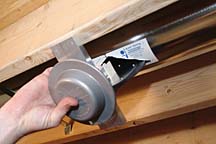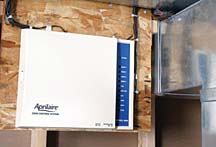Those are just a couple of the notions some contractors have about zoning systems. According to some manufacturers, these contractors need to become more familiar with today's zoning technology, reevaluate their attitudes toward zoning, and take another look at the needs of their customers. In fact, several companies believe that zoning is simpler than it used to be, can bring in profits, and, most importantly, can provide consumers with the comfort they desire.

Give Homeowners What They Want
Customers may not be savvy when it comes to the HVAC technology available on the market, but they do know that areas in their home can have major inconsistencies in temperature."Consumers, for the most part, are not familiar with the term zoning as it relates to their HVAC equipment," said Mark Votaw, production manager for Arzel Zoning. "Most every homeowner is, however, aware that parts of his home are uncomfortable or lack proper conditioning."
Votaw believes that there is a definite market for zoning among today's homeowners.
"Zoning demand is fueled by the changing use patterns of occupants," he said. "We see a number of home offices created out of basement space or extra bedrooms. We see multigenerational families that convert the use pattern of a home to accommodate extra occupants. Every change like this is a zoning opportunity."
The job of the contractor is to tap into these opportunities.
"Homeowners know that these problems exist," said Mike Reilly, vice president of marketing and sales for EWC Controls. "All you have to do is ask questions. Ask if they are dissatisfied with comfort levels. Nine times out of 10 they say they are."
Contractors not only need to appeal to homeowners when it comes to zoning, but to home builders as well.
Another misconception among contractors is that a builder will not want to adopt a zoning system into his plans. Reilly believes the opposite is true.
"Home builders want their homes to be the most competitive out there," he said. "They want the home buyer to pick their home over another home."
Reilly believes that zoning can add that extra comfort incentive that will convince a consumer to buy a new home. It can also provide an energy benefit.
"Properly designed zoned homes can offer a significant reduction in energy usage," said Votaw. "Builders are all about return on investment. If you show them that adding a zoning system boosts the value of the home higher than the cost of the system, then they will install it."

Easier For Contractors
Some contractors are hesitant about installing a zoning system because they believe it is too complicated and time consuming. Not so, according to Reilly.He believes contractors get bogged down when it comes to wiring and airflow.
"If you can wire a thermostat, you can wire a zoning system," Reilly said. "It is just letter to letter. We are not doing anything different. The thermostat goes to the zone board and the zone board to the furnace board."
Bypass air has also been a delicate application for contractors to consider. According to Votaw, technology has improved over the years, making it easier to deal with bypass air.
"Contractors will point to a lack of adequate ducting, concerns about bypassing air when dampers are in a closed position, or simply the inability to train service techs in the setup and installation of a system," he said.

Some contractors who want to provide their customers with better indoor comfort have opted to install two separate heating and cooling systems rather than a zoning system.
"The No. 1 misconception is that they can make more money installing multiple heating and cooling systems than by installing a zone comfort system," said Joe Hlavacek, product manager for Aprilaire. "When, in reality, a contractor can increase his profits by selling zone control in place of multiple systems."
He suggested that contractors should differentiate their bids and use zoned comfort control to win more business when comparing multiple systems. From there, he suggests contractors offer upgrade options, such as higher SEER-rated equipment, and accessories such as humidifiers, high-efficiency air cleaners, and UV germicidal lamps.

Comfortable With Zoning
There are several ways for contractors to get comfortable with offering zoning and installing it.EWC Controls offers training classes. According to Reilly, the company holds the training sessions through wholesalers or instructors can go directly to a contractor's shop or jobsite.
He said that it usually only takes a few hours of training before technicians have a better understanding of what they are doing.
Aprilaire recommends that contractors use zoning manufacturers as a resource for training.
"We offer a contractor personal use program, which is designed to not only get contractors familiar with the installation, but also a chance to live with the system and experience it firsthand," said Hlavacek.
According to Votaw, this firsthand experience is indispensable.
"The best way to get comfortable with zoning is to give it a try," he said. "Install a system in your own home or in the home of one of your key employees. Most manufacturers give substantial discounts for contractors' personal use for just this reason. It will give your installers and technicians a chance to get use to the product and your sales team can see the dramatic comfort effects immediately."
Votaw said that zoning technology is also becoming friendlier to use and install. For example, he points to Arzel's dampers, which can be placed right into the ductwork without much fuss.
Aprilaire has introduced its Model 6504 Intelligent Zoned Comfort Control Support System. The control panel enables the consumer to control all thermostats from any thermostat in the system. In addition, the system can provide control of fresh air ventilation, electronic air cleaners, and an ERV.
Hlavacek said that he sees zone controls becoming the next "programmable thermostat" of the future, meaning that contractors will become more comfortable with the product's installation and operation. Zoning technology seems poised to become a burgeoning trend in the market.
"It just makes sense from all points of view," he said. "It's more comfort than a single non-zoned system, lower cost than multiple systems, and it saves energy. Market penetration will be the biggest change for the future."
Publication date: 05/24/2004




